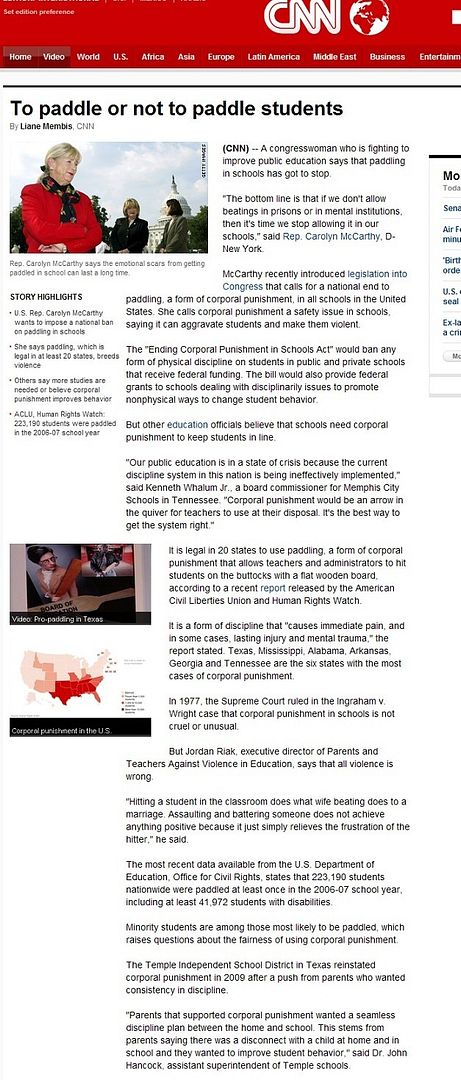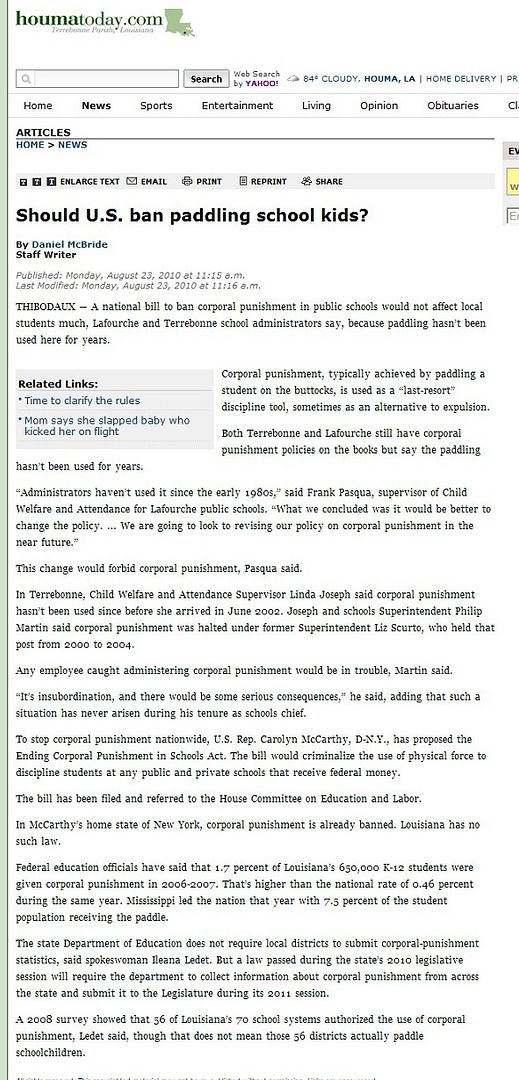San Angelo Standard Times, Texas, 2 August 2010
Private school creates foundation with the building blocks of success
By Laurel L. Scott
(extracts)
Tim Lester / Standard-Times
Jennifer Simon performs individual summer tutoring with Devo Coleman at San Angelo Christian Academy on July 22. Simon is going into her second year of teaching English at San Angelo Christian Academy and holds a specialization in teaching children affected with dyslexia.SAN ANGELO, Texas -- The Church of Christ-based San Angelo Christian Academy is starting its sixth school year with a new administrator, a new 4,961-square-foot building and newly achieved accreditation from the National Christian School Association.
Administrator Larry Hettick, who was hired in February, brings four decades of experience in education to his role. He earned his administrator certification and a master's degree in educational administration in California.
"One of the board members knew I had the educational background that I had and called about the opportunity," he said. "It's been a good marriage."
One of his first mandates was to get the school accredited, he said.
"The visiting committee report called us an 'outstanding school,'" Hettick said.
[...]
The new $1.5 million building adds six classrooms, a science lab, a teachers' lounge, and a tutoring room that will allow the school to add a grade each year through 12th grade so that students can continue their education through graduation. This school year, which starts Aug. 16, will include the first class of ninth-graders.
[...]
"We strive to maintain a Christian environment," Hettick said. "We do use corporal punishment unless the parent objects. It's in our by-laws. I spank them and hold them and tell them we love them. That's my main job, discipline, and making sure a Christian environment is maintained."
[...]
© 2010 San Angelo Standard Times. All rights reserved.
CNN.com, 5 August 2010
To paddle or not to paddle students
By Liane Membis, CNN
Rep. Carolyn McCarthy says the emotional scars from getting paddled in school can last a long time.(CNN) -- A congresswoman who is fighting to improve public education says that paddling in schools has got to stop.
"The bottom line is that if we don't allow beatings in prisons or in mental institutions, then it's time we stop allowing it in our schools," said Rep. Carolyn McCarthy, D-New York.
McCarthy recently introduced legislation into Congress that calls for a national end to paddling, a form of corporal punishment, in all schools in the United States. She calls corporal punishment a safety issue in schools, saying it can aggravate students and make them violent.
The "Ending Corporal Punishment in Schools Act" would ban any form of physical discipline on students in public and private schools that receive federal funding. The bill would also provide federal grants to schools dealing with disciplinary issues to promote nonphysical ways to change student behavior.
But other education officials believe that schools need corporal punishment to keep students in line.
"Our public education is in a state of crisis because the current discipline system in this nation is being ineffectively implemented," said Kenneth Whalum Jr., a board commissioner for Memphis City Schools in Tennessee. "Corporal punishment would be an arrow in the quiver for teachers to use at their disposal. It's the best way to get the system right."
It is legal in 20 states to use paddling, a form of corporal punishment that allows teachers and administrators to hit students on the buttocks with a flat wooden board, according to a recent report released by the American Civil Liberties Union and Human Rights Watch.
It is a form of discipline that "causes immediate pain, and in some cases, lasting injury and mental trauma," the report stated. Texas, Mississippi, Alabama, Arkansas, Georgia and Tennessee are the six states with the most cases of corporal punishment.
In 1977, the Supreme Court ruled in the Ingraham v. Wright case that corporal punishment in schools is not cruel or unusual.
But Jordan Riak, executive director of Parents and Teachers Against Violence in Education, says that all violence is wrong.
"Hitting a student in the classroom does what wife beating does to a marriage. Assaulting and battering someone does not achieve anything positive because it just simply relieves the frustration of the hitter," he said.
The most recent data available from the U.S. Department of Education, Office for Civil Rights, states that 223,190 students nationwide were paddled at least once in the 2006-07 school year, including at least 41,972 students with disabilities.
Minority students are among those most likely to be paddled, which raises questions about the fairness of using corporal punishment.
The Temple Independent School District in Texas reinstated corporal punishment in 2009 after a push from parents who wanted consistency in discipline.
"Parents that supported corporal punishment wanted a seamless discipline plan between the home and school. This stems from parents saying there was a disconnect with a child at home and in school and they wanted to improve student behavior," said Dr. John Hancock, assistant superintendent of Temple schools.
"We worked to define what is considered corporal punishment and made that clear to parents. Corporal punishment is not used at a first resort; it is used in extreme cases of student behavior," he said.
Mississippi leaves decisions about corporal punishment up to local school districts.
But Mississippi PTA President Deloris Irving says her state organization follows the position of the national PTA, which favors the abolishment of corporal punishment in all schools.
Irving acknowledged that discipline can provide for a better learning environment. But she also said parental concerns about corporal punishment center on whether it would be administered properly, at the right time and without abuse.
The fear that disproportionate paddling will increase violence by students is what most concerns McCarthy, who attended Catholic school as a child and was rapped on the knuckles with a ruler for misbehavior.
"Some people believe children are too young to understand, that corporal punishment is a quick fix to deal with behavioral issues," she said. "But emotional scars [from paddling] are very deep. I have met young people who were paddled, and they say it has affected them in so many ways."
Paddling and other forms of corporal punishment create "a violent, degrading school environment in which all students -- and particularly students with disabilities -- may struggle to succeed," the ACLU reports.
Without paddling, students would be less likely to become antisocial or aggressively violent, McCarthy said, and this is especially important for minorities and students with disabilities who may have a harder time fitting into certain social situations.
Marjorie Gunnoe, a psychology professor at Calvin College in Grand Rapids, Michigan, agrees that physical acts have an effect on children's development. "A child's behavior plays a key role to how they will function in other aspects of their life, including education," she said.
However, before making national decisions on whether or not corporal punishment should be eliminated, Gunnoe said that legislators will need more proof that children who aren't spanked or paddled are actually better off.
Gunnoe recently conducted a study with 180 teenage children on spanking and its risk factors in childhood. She found that children who remembered being spanked on their bottom with an open hand performed better in school academically, did more volunteer work and were more optimistic in terms of their future, compared with children who had never been spanked.
"I'm not advocating or promoting spanking," Gunnoe said. "If we are going to outlaw it, we need some evidence that kids that have never been spanked actually perform better, and we really don't have that yet."
The belief that physical discipline promotes good behavior, which is necessary for academic progress, is what keeps Whalum pushing for corporal punishment to remain in schools.
Whalum was elected to the Memphis City School Board by running on a pro-corporal punishment platform in 2004. This past June, he attempted to push through a resolution to bring corporal punishment back to Memphis City Schools, after it was abolished in a 5-to-4 vote in 2004, but his proposition failed to receive enough support from other board members.
Whalum says legislators need to understand that environment plays a major role in producing certain behaviors in students.
"The problem in Memphis, like many other large, poor and urban school districts, is that poverty creates an insurmountable boundary against a child receiving a well-rounded education," he said. "When you remove the ability for the school to discipline students, as they did in the old days, you are creating a system that serves to undermine students' progress in school."
Whalum supports corporal punishment not as a lone resource but as part of a larger disciplinary plan that works toward decreasing classroom interruptions that take away from instruction time.
Julian Mansfield, a 19-year-old student who lived in Memphis and attended public schools there, agrees with Whalum's support for corporal punishment. He says the potential shame caused by corporal punishment is more a deterrent than the threat of pain.
"It's the fact that you're going to get embarrassed in front of all your peers that keeps you from wanting to act up," he said. "I think people need to understand there is a psychological effect in corporal punishment, more than the physical, that really helps to curb bad behavior in schools."
But this style of ridicule, McCarthy said, does not set a good example for students.
"Paddling does not send children the right message," the congresswoman said. "It reinforces the idea that being violent is the only way to handle a conflict. Corporal punishment goes against what we have been teaching students for years."
The idea of a positive behavior system, like McCarthy's plan, does not work in urban areas like Memphis, Whalum said.
"The problem now with a behavior-reward system is that there is nothing being done to discourage misbehavior," Whalum said. "You have to show students that there are consequences, or they won't learn to behave."
Outrage over the increase of misbehavior by urban students in Memphis is pushing teachers and administrators toward a revolution in public education, Whalum said. He said that of the nearly 700 teachers and parents that he polled, 75 percent supported the reinstitution of paddling in schools.
Stories of violent behavior are not uncommon in areas like Memphis. Teachers tell of being attacked by defiant 12-year-olds and of amassing medical bills for injuries caused by students. Whalum said that the most disturbing issue is that schools are suspending and expelling kindergartners and elementary school students for aggressive behavior, actions that can result in the criminalization, rather than education, of students.
Gunnoe is wary of giving schools the power to discipline someone else's child. "It's really the parent's business to discipline the children, not the school," she said. "It becomes a very risky situation when schools become responsible for children long term, and moreover if hitting or any form of physical punishment is involved."
But parents don't always step up to the task, says Riak, and that can also harm the child.
"In the inner city, children grow up in families where they are neglected, and that's just as bad as hitting because they don't have the right guidance and support. On the other hand, you can't let students run around and do what they want to do. Permissiveness is not an alternative to spanking either."
© 2010 Cable News Network. Turner Broadcasting System, Inc. All Rights Reserved.
The Rocky Mount Telegram, N. Carolina, 16 August 2010
School board reviews corporal punishment
By Jim Holt
Rocky Mount Telegram(extract)
NASHVILLE -- The Nash-Rocky Mount school board evaluated a corporal punishment policy as well as school overcrowding issues at a meeting Monday.
The board approved a policy stipulating that corporal punishment must not be administered on a student with a disability whose parent or legal guardian expressly forbids it in writing.
Vice Chairwoman Evelyn Bulluck spoke in favor of banning the entire practice of corporal punishment in the district because "only one school" in the district continues to practice it.
Superintendent Rick McMahon confirmed Parker Middle School, with long-standing principal Charles Davis at its head, as the school that administers corporal punishment.
Board member Walt Wiggins said he's in favor of corporal punishment, and the one school that has allowed it has shown to be one of the best in the district.
In other business, [...]
[...]
Copyright 2010 Rocky Mount Telegram All rights reserved.
The Houma Courier, Terrebonne Parish, Louisiana, 23 August 2010
Should U.S. ban paddling school kids?
By Daniel McBride
Staff Writer
THIBODAUX -- A national bill to ban corporal punishment in public schools would not affect local students much, Lafourche and Terrebonne school administrators say, because paddling hasn't been used here for years.
Corporal punishment, typically achieved by paddling a student on the buttocks, is used as a "last-resort" discipline tool, sometimes as an alternative to expulsion.
Both Terrebonne and Lafourche still have corporal punishment policies on the books but say the paddling hasn't been used for years.
"Administrators haven't used it since the early 1980s," said Frank Pasqua, supervisor of Child Welfare and Attendance for Lafourche public schools. "What we concluded was it would be better to change the policy. ... We are going to look to revising our policy on corporal punishment in the near future."
This change would forbid corporal punishment, Pasqua said.
In Terrebonne, Child Welfare and Attendance Supervisor Linda Joseph said corporal punishment hasn't been used since before she arrived in June 2002. Joseph and schools Superintendent Philip Martin said corporal punishment was halted under former Superintendent Liz Scurto, who held that post from 2000 to 2004.
Any employee caught administering corporal punishment would be in trouble, Martin said.
"It's insubordination, and there would be some serious consequences," he said, adding that such a situation has never arisen during his tenure as schools chief.
To stop corporal punishment nationwide, U.S. Rep. Carolyn McCarthy, D-N.Y., has proposed the Ending Corporal Punishment in Schools Act. The bill would criminalize the use of physical force to discipline students at any public and private schools that receive federal money.
The bill has been filed and referred to the House Committee on Education and Labor.
In McCarthy's home state of New York, corporal punishment is already banned. Louisiana has no such law.
Federal education officials have said that 1.7 percent of Louisiana's 650,000 K-12 students were given corporal punishment in 2006-2007. That's higher than the national rate of 0.46 percent during the same year. Mississippi led the nation that year with 7.5 percent of the student population receiving the paddle.
The state Department of Education does not require local districts to submit corporal-punishment statistics, said spokeswoman Ileana Ledet. But a law passed during the state's 2010 legislative session will require the department to collect information about corporal punishment from across the state and submit it to the Legislature during its 2011 session.
A 2008 survey showed that 56 of Louisiana's 70 school systems authorized the use of corporal punishment, Ledet said, though that does not mean those 56 districts actually paddle schoolchildren.
Copyright © 2010 HoumaToday.com. All rights reserved.
About this website
Search this site
Archive 2010: USA
Illustrated article: US school CP
Other external links: US school CP
Video clips
Picture index
Previous month
Following month




